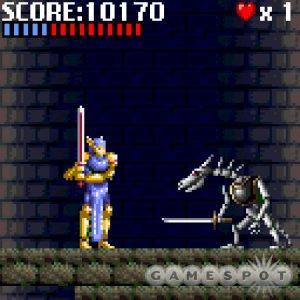The mobile arena is subject to a high volume of retro ports. Sometimes, when a console or arcade favorite of yesteryear goes wireless, the result can be quite satisfying, such as in recent cases of games like Gradius and Ninja Gaiden. At least as often, though, too much is lost in translation. Unfortunately, Actraiser, which is based on Enix's classic action strategy game for the Super Nintendo Entertainment System, falls into this latter category. This bad game is Actraiser in name only.

In Actraiser, you play a deposed deity who must fight to protect his worshippers from a generic menace, called the "Evil One." Said villain imprisons you, and proceeds to send several creatures to terrorize your people. Upon escaping, your immediate concern is to reclaim rule of your world. This backstory--which we are recalling from the SNES version of the game--is not directly presented in the mobile Actraiser, which starts gamers in medias res.
The SNES Actraiser's gameplay was twofold, with action-platforming sequences punctuated by strategy gameplay segments, the goal of which was to rebuild cities liberated from the Evil One. This strategic portion of the gameplay has been completely omitted from the mobile version. There's no world map, and you can't save your progress during the course of the game, either. That's OK, though, because this version of the game has only three short levels of monster-mashing.
It would have been possible to accept this game as a small portion of Actraiser, similar to Castlevania Part I on Sprint, if the mobile offering's core gameplay weren't crippled. While the original game gave you magic and ranged weapons to complement the melee action, the mobile Actraiser leaves you with a single attack. The game's level designs haven't changed accordingly, however. In some cases, it's nearly impossible to avoid taking damage. Furthermore, the game forces you to exploit its buggy artificial intelligence in order to succeed. Certain creatures will chase you. If you lead one of them into a ditch, it will be unable to move, rapidly switching directions in a vain attempt to escape.
These problems are most apparent during Actraiser's three boss battles. There is literally no way to beat the second boss without taking heavy damage. You can't jump over him; you can't dodge his attacks when he leaps toward you. Simple perseverance wins the day here.
When you beat the game's third boss, you'll be transported back to the first level without explanation. Although this seems like a lame way to extend the game's value, the purported idea is to play through the game as many times as possible, thereby achieving a high score. However, there's little motivation to do so, since the gameplay doesn't change up. Actraiser mobile has no power-ups to speak of, so you'll just have to make do with three unrestorable lives.

Actraiser's best feature is, indisputably, its presentation. While the game doesn't nearly match the graphical acclaim of its forebear, it's not bad looking for a Series 60 title. The game's sound fares even better, having been culled directly from the stirring musical score of the original. However, the music loops awkwardly, which is jarring.
In the end, the mobile manifestation of Actraiser is but a pale shadow of its former glory. The lack of the original game's city-building mode hurts; the inability to shoot arrows and use magic hurts more. Sporting only three short levels--replete with AI bugs--Actraiser isn't recommendable to even the most forgiving of gamers.